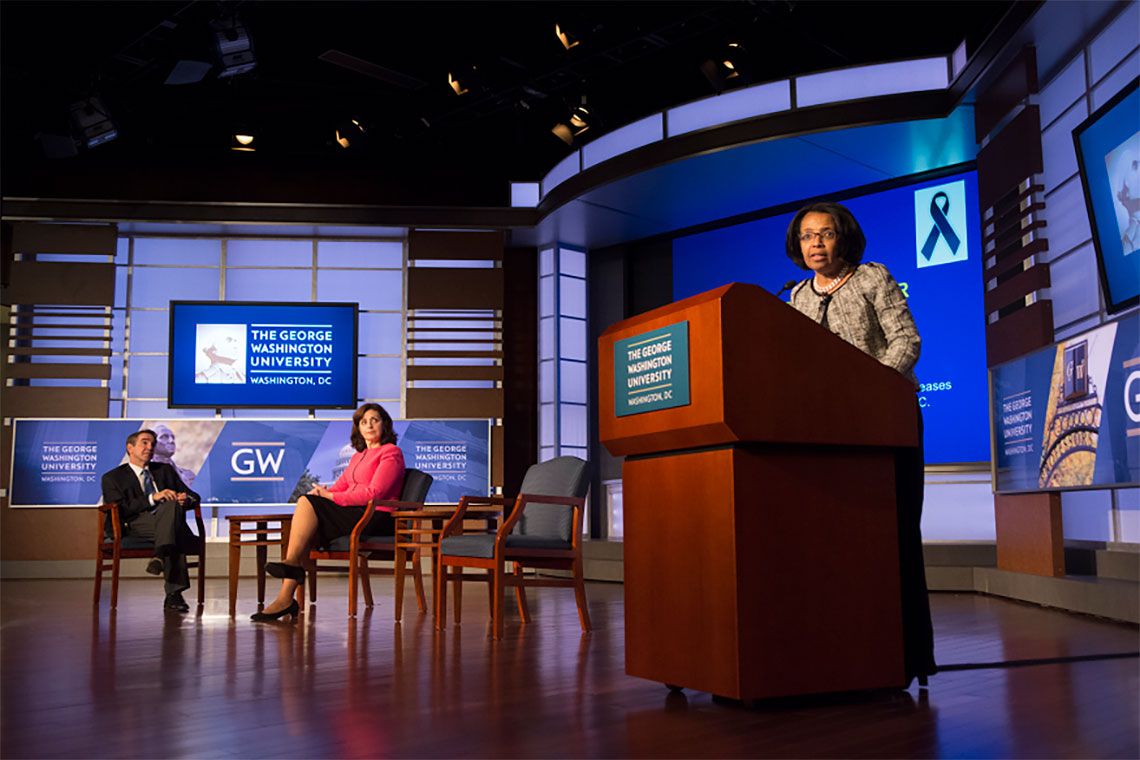
There are myriad strategies for combating cancer, but the simple answer lies in screenings; early detection can significantly improve a patient’s odds for survival. The politics around screenings, however, are far from a straightforward equation of screening plus early detection equals a long, happy, healthy life.
“You’ll see, how dramatically things have changed and how much controversy there is about cancer screening and surveillance,” said Alan Wasserman, M.D., MACP, the Eugene Meyer Professor of Medicine, and chair of the Department of Medicine at the GW School of Medicine and Health Sciences (SMHS). “You would think this would be a black-and-white topic, but it’s not; it’s changing all the time. Part of the reason we wanted to have this event was to show what has changed and what needs to be done.
“What You Need to Know about Cancer Prevention and Screening,” was the latest installment of the Frontiers in Medicine series, held on Oct. 14, designed to connect members of the Washington, D.C. metropolitan community with renowned health experts. The panel featured three SMHS physicians: Thomas W. Jarrett, M.D., professor and chair of the Department of Urology; Rachel Brem, M.D., professor of radiology and director of the Breast Imaging and Intervention Center; and Marie Borum, M.D., M.P.H. ’95, professor of medicine and director of the Division of Gastroenterology.
“We’re really fortunate to have these physicians speaking because they’re all advocates and feel passionately about their field and about cancer surveillance in their areas,” Wasserman said. “It really is amazing when you have people that believe strongly in what they do and, would rather prevent these problems than have to deal with larger problems later.”
Jarrett, Brem, and Borum, speaking about prostate, breast, and colon cancer, respectively, pointed to several of the same guidelines of preventative care. Screenings should typically begin around age 40, unless a family history of the disease or a high risk — particularly for African Americans, who are more susceptible to various kinds of cancer — necessitates an earlier screening. Once a patient has been screened, they should continue to get screened on a regular basis.
In the case of prostate cancer, the number two leading cause of cancer death in men, screenings include a prostate specific antigen (PSA) blood test or a digital rectal exam. A biopsy is required before a physician can determine the diagnosis, but the screening assesses who might be at risk.
“Since the advent of PSA screening, there’s been a dramatic decrease in the death rate for prostate cancer,” Jarrett said.
The problem with screenings for prostate cancer arises with recommendations, such as those from the United States Preventive Services Task Force (USPSTF), an independent panel of experts that reviews the effectiveness of clinical preventive services. In 2012, USPSTF recommended against the PSA screening, citing the benefit of the screening did not outweigh the harms of treatment, such as overtreatment and severe side effects associated with treatment such as incontinence and impotence.
“The problem with the recommendation is it had a devastating effect,” Jarrett said. “This was front page of the paper in 2012, and suddenly, men started coming in saying, ‘Great news; I never have to worry about prostate cancer.’ This is the number two killer of men, and as men are living longer, we’re going to see more of it; maybe this is not the right approach.’”
The USPSTF recommendation for breast cancer evoked a similar response. Currently, one out of every eight women get breast cancer, and almost one-third of cancers in women are due to metastasizing breast cancer. The disease is not preventable, but if detected early, treatments are highly effective. “We have to detect breast cancer when it’s localized in the breast, because breast cancer is a curable disease,” Brem said. “The survival from early-stage breast cancer is 95 percent, and that’s not so for later-stage breast cancer.”
The primary method of screening is mammography, which has contributed to a 30 percent decrease in breast cancer death rates over the last two decades. Women should get screened every year starting at age 40, but the USPSTF determined the more appropriate age was 50. “We know definitively that one in six breast cancers in the United States occurs in women in their 40s, that women in their 40s have more aggressive cancers, and it’s critical to diagnose them earlier,” Brem argued.
The USPSTF also recommended against clinicians teaching their patients self-examinations and suggested that multiple screenings and biopsies cause undue stress on a patient. Brem disagreed.
“As someone who has been taking care of women with breast cancer for 30 years, I can tell you, the fatigue and stress of telling someone they have metastatic breast cancer is far greater than telling them they need to come back for another mammogram,” she said.
She added succinctly, “The most important message that I can leave for you today is that mammography saves lives, and one of those [lives] could be yours, so get your screening mammograms.”
Borum’s approach to colon cancer screenings is the same. “Just like prostate cancer and just like breast cancer, [colon cancer] is one of the most common cancers we see in the United States. It’s one of the most common cancers people die from in the United States. But it’s one of these cancers that if we catch it earlier, we can cure it, and if we screen for it, we can prevent it.”
Most colon cancers come from polyps. “Polyps are not cancer, but if we take them out, we can prevent cancer,” Borum explained. “The problem is that not all polyps will become cancers, but 95 percent of cancers come from polyps, so you must find them and you must take them out.”
While other procedures are available, colonoscopy remains the gold standard for screenings, as it not only allow physicians to detect polyps, but also enable physicians to remove them. The USPSTF, however, has recommended screening guidelines that Borum, like her fellow physicians, opposes. “What continues to puzzle me is that the Task Force recommends that you can get a flexible sigmoidoscopy every five years or a colonoscopy every 10,” she said. “The reason why this puzzles me is because a flexible sigmoidoscopy only screens a part of the colon. So, while I don’t want to be disparaging, it’s like screening only one breast. Why are you going to screen only part of your colon? You should probably get a colonoscopy.”
Colon cancer can be cured, but the key, as with the other cancers mentioned during Frontiers in Medicine, is early screening. “You want to try to catch the cancer before it catches you,” Borum said. Despite USPSTF recommendations, all three physicians recommend screening: screening early and screening regularly.


